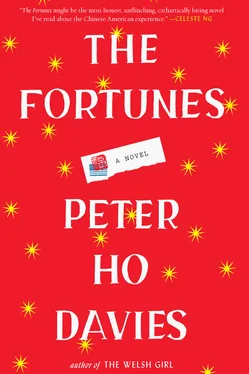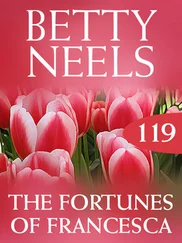Spurned by a man, spurned by a country. She’s not about to kill herself for either.
GONG
It storms for four straight days. In the depths of each trough she’s pressed into her mattress springs as if by a lover; at the crest of each wave she feels momentarily weightless, as if her spirit were rising out of her flesh. And then it’s calm again. The distant dinner gong summons her like a cue.
HOME AGAIN
The Hoover steams under the partially constructed Golden Gate Bridge into San Francisco on October 16, 1935. There’s still no roadway, but the first long swoops of cable have recently been draped across the bay like a garland. “Welcome home!” passengers call to one other. Beyond the bridge, everyone clusters to starboard to watch the white city rising up Telegraph Hill like a cloud of fog around another new marvel, the Coit Tower. Only she stands to port, studying Angel Island, the immigration station where thousands of Chinese have been detained over the past three decades, as it slips astern. It’s as close as many of them have come, she knows: able to see Gold Mountain but never touch it.
The great ship beneath her slows and settles into a filigree scum of froth.
DREAMS
Throughout her career she’d occasionally steal into theaters to watch her own movies with an audience. She liked to sit toward the front and side near the organ. The Mighty Wurlitzer at the Chinese Theatre was decked out in red and gold to match the decor, the curved tiers of keys like stalls and circle and balcony in miniature, and she would imagine the crowd settling into their velvet seats behind and above her. And then when the lights went down she would turn and watch their faces. She enjoyed their looks of shock when the house lights came up and they recognized her, but even better was the moment of confusion just before that, before they placed her, when they smiled, half consciously knowing they knew her but not from where. They looked so shyly vulnerable for a moment, as if they thought she knew something about them. She felt like she was waking them from a dream.
But in later years, in smaller roles, she could stand in the gilded lobby of the Chinese Theatre as they filed out and not a single person would glance at her as they hurried out into the night. She might as well have been one of the art deco figures adorning the walls, their smooth mirrored faces stoically blank. By then the organ had been removed. She missed the terraced keyboard, the neat black-and-white ranks like a tuxedoed audience for a premiere.
Once, in 1936, she goes incognito, in turban and sunglasses, to attend a screening of her old acquaintance Leni Riefenstahl’s Triumph of the Will, and while she knows better than to advertise their relationship, she finds herself secretly envying Leni her ecstatic patriotism.
AND THE WINNER IS…
Luise Rainer accepts the 1936 Academy Award for Best Actress for her role in The Great Ziegfeld. Luise Rainer accepts the 1937 Academy Award for Best Actress for her role in The Good Earth.
Rumor has it that Rainer was so sure she wouldn’t win a second time she stayed home in her pajamas. Called with the news of her win, she dashed to the ceremony without even putting on makeup, but fought with husband Clifford Odets on the way and had to pace five times around the Biltmore before she was steady enough to enter and receive her award.
Between 1936 and 1937 the Rape of Nanking, among other atrocities, has put acting prizes in proper perspective. Yet still it stings when Madame Chiang Kai-shek, wife of the Nationalist leader, remarks after a specially arranged screening that she can’t believe Rainer isn’t Chinese.
“BLOODY SATURDAY”
During the bombing of Shanghai in 1937, Newsreel Wong will take one of the most famous images of the war: a baby, bloodied and crying, in the ruins of the railroad station. “My shoes were soaked in blood,” he’ll recall later. By the time Life reprints it in October, an estimated 140 million people will have seen it. Eventually it will be credited with turning the tide of Western public opinion against Japan. For years afterward rumors will swirl that the photo was posed, the image manipulated.
All in a good cause, she’ll think, though how could he have stood to take it and not immediately scoop up the wailing infant?
The fate of the crying baby, an orphan — or warphan, in the famous coinage of the childless Madame Chiang — is unknown.
The next year MGM will release a film called Too Hot to Handle, about a newsreel cameraman in China faking footage of an aerial attack. Starring Clark Gable and Myrna Loy.
FATHERS
Warner was right about Luise, but she’ll never have the chance to tell him. He’ll walk off the set of Charlie Chan at Ringside, his eighteenth Chan film, in 1938. After disappearing on a weeks-long bender, followed by a spell in a drying-out hospital and an acrimonious divorce, he’ll leave the country, reemerge months later in his native Sweden, only to succumb to pneumonia.
At least he died at home, her father will note. His sojourn in China will last only a year beyond her visit. He’ll be forced to return to Los Angeles after the Japanese invasion of China, forced to leave her stepmother, her half-brother. She’ll greet him off the gangway— Welcome home! — and he’ll look at her as if it’s her fault. She’ll throw her arms around him anyway.
Gold Mountain was only ever where he planned to live and work until he got rich. But he’ll die there, in 1949, and she’ll attend his funeral and arrange his interment beside her mother, whose bones had never been sent to China. She won’t go out to Rosedale to visit them as often as she should, but sometimes she’ll sit in the vast, cool barn of the waiting room at Union Station, thinking of them and the home they made nearby, listening to the click of heels on the terra-cotta tiles echoing back off the travertine walls (a temple to trains, her father called it once) until she grows self-conscious about having no one to meet, no train to catch.
Near the end of their affair, when she was blue, Doug used to call her Sum Ting Wong; at the start, he’d told her she was really something. When he dies, in 1939, she’ll read that his real name was Douglas Ullman. His last words: “I’ve never felt better.”
Irving Thalberg hadn’t lived to see The Good Earth open.
Walter Benjamin, who wrote that her name unfolded like “a moon-filled blossom in a cup of tea” but also misspelled it as Anne May Wong, committed suicide in 1940 rather than fall into Nazi hands.
Even Carole Lombard, the profane angel, will die: in a plane crash in 1942.
Only Charlie Chan will live on, a new yellowface actor, Sidney Toler, taking on the role vacated by Warner. Even the footage from Charlie Chan at Ringside will enjoy a second life, Warner’s scenes reshot with Peter Lorre in yellowface as the Japanese detective Mr. Moto, the film released as Mr. Moto’s Gamble.
Poor Warner was right about that too. He was never the star.
THE UNDERSTUDY
In 1940 her younger sister, Mary, will hang herself in her garage — out of despair at her stalled acting career, it’s rumored. Another butterfly killing herself for unrequited love.
“She always wanted my roles.”
“She always wanted to be you,” her father accuses. It’s true, she thinks (even though she’s always suspected that Mary took her name from Mary Pickford to spite her). Once, tipsy in Berlin, the girl had crashed the car and given her famous sister’s name to the polizei.
“I’ll never forgive you for encouraging her,” her father says.
“For once,” she tells him, “we agree.”
Читать дальше












